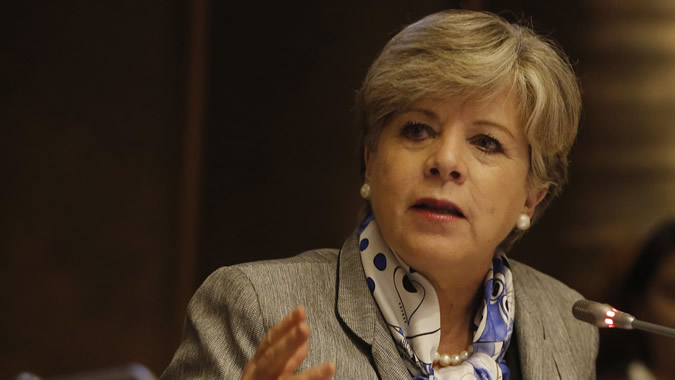ECLAC Emphasizes Need to Advance on Integration with Common Rules for Trade and Investment
The Executive Secretary of the UN Commission, Alicia Bárcena, spoke at a high-level event organized by the OECD and the government of Chile.

The region of Latin America and the Caribbean must decidedly make progress on economic integration and move towards an integrated space with common rules for trade and investment, Alicia Bárcena, the Executive Secretary of the Economic Commission for Latin America and the Caribbean (ECLAC), said today during a high-level conference held in Santiago, Chile.
The senior United Nations official was the keynote speaker during the first day of the 5th Plenary Meeting of the OECD Initiative for Policy Dialogue on Global Value Chains, Production Transformation and Development—a gathering organized by the Organization for Economic Cooperation and Development (OECD) and the government of Chile.
Andrés Rebolledo, General Director of International Economic Relations at Chile’s Foreign Affairs Ministry, and Mario Pezzini, Director of the OECD’s Development Center, participated in the event, along with other authorities from various countries and experts from international organizations.
In her speech, Bárcena addressed the situation of the region in the current international context, in which there is a recessive bias that keeps global trade from recovering the dynamism it showed during the period prior to the 2008-2009 crisis. She indicated that we are facing a change in the economic cycle that is characterized by excess liquidity, a decline in aggregate demand, weaker capacity on the part of emerging countries to absorb external impacts, the deceleration of China, growth of financial assets above that of the real economy, and a changed trend in capital flows towards the region.
“Given this outlook, we urgently need industrial and technological policies with environmental sustainability that enable us to grow to equalize and to equalize to grow,” ECLAC’s Executive Secretary stressed. “We must also foster value chains to achieve greater resilience in intraregional trade and production and export diversification.”
Bárcena recalled that the region’s export performance between 2012 and 2015 was the worst in eight decades and the value of its shipments abroad is expected to drop -14% this year, according to statistics released by ECLAC a few weeks ago. She indicated that Latin America is at a crossroads: either it continues along the current path restricted by the global context, or it commits to a more active international insertion that prioritizes industrial policy, diversification, trade facilitation and intraregional integration.
The UN official said that countries should work to reinvigorate weak intraregional trade, attract foreign direct investment towards non-extractive sectors that favor links with local and regional suppliers, promote the Trade Facilitation Agenda, diversify and promote industrialization and innovation, and stimulate reciprocity and coordinated regional action in light of weak global governance.
Bárcena also insisted that it is essential for the region to join the digital revolution in order to be competitive in global trade. She noted that the steady expansion of Internet use and access—especially from 2002 to 2014—reveals structural weaknesses in Latin America and the Caribbean, among them the exogenous progress of digital economies, an international insertion model based on exporting low-technology products, and the lack of a structural strategy, which contributes to unstable economic growth.
“Digital economies lead to innovation, development and participation in global value chains, larger consumer bases, and the expansion of all economic sectors,” Alicia Bárcena stated.
She added that the region must link industrial policies with digital development, train human capital for a new digital era, participate in global forums on Internet governance and interoperability, develop appropriate regulatory frameworks, and create conditions to spur investment and innovation.
Country(ies)
- Latin America and the Caribbean
Contact
Public Information Unit
- prensa@cepal.org
- (56 2) 2210 2040